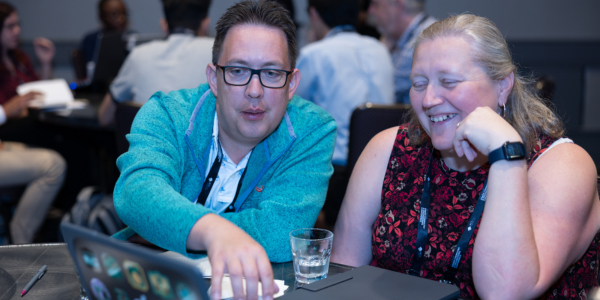This article was originally published in The Nexus.
Contributed by David A. Laviska, Portfolio Manager for Green Chemistry and Sustainability in Education, ACS Green Chemistry Institute
As chemistry educators, we want students to understand that chemistry is a complex – but fascinating and elegant – science and a critical component of strategies for developing solutions to complex global challenges such as those addressed in the U.N. SDGs.

In December 2023, the American Chemical Society Green Chemistry Institute (ACS GCI) Office of Sustainability hosted the Second Annual Sustainability Summit at ACS headquarters in Washington, DC. The theme of the in-person summit was United Nations Sustainable Development Goal (U.N. SDG) #4: Quality Education. One of the central discussion topics was the urgent need for more green and sustainable chemistry throughout higher education. Included in the agenda were brief presentations that introduced a few of the new “Green Chemistry and Systems Thinking in Chemistry Education” teaching/learning modules developed and published by the ACS GCI. These new teaching resources are being developed by and for chemistry instructors working in higher education and teaching courses that fall within the standard chemistry curriculum. Built around core chemistry concepts (primarily general and organic chemistry), our modules provide instructors with strategies for inspiring students to think beyond the textbook and recognize that chemistry is not only everywhere around us, but key to many of the most important innovations that influence our quality of life.
Since publishing our first Green Chemistry Learning Module in late 2023, additional modules have been posted on the ACS website at a rate of approximately one per month, resulting in a total of ten available to the public as of October 2024. Topics addressed in the current inventory are drawn from standard curricula for both general chemistry (ideal gases, fuels, nitrogen cycle) and organic chemistry (stereochemistry, SN1 & SN2 reactions, carbonyls, et al.). We anticipate the release of 2-4 additional modules by the end of 2024 and up to two dozen more in 2025.
All modules have been developed by experienced instructors from higher education institutions located throughout the U.S. and Canada. As explained on our website, modules address foundational chemistry concepts while connecting them to the tenets of Green Chemistry and providing context through references to the U.N. SDGs. One of the central goals in the development of these teaching materials is to show students (and instructors!) the value of thinking about chemistry from a “systems” perspective. This means thinking beyond the reaction flask to the broader implications of the chemicals we consume and the products we create.
Chemists and chemical engineers have key roles to play in reimagining every aspect of the broader chemistry enterprise, from the choice of feedstocks and reactants through laboratory experiments and manufacturing processes to product life cycles, efficiency, and reduction of waste. Thinking holistically about the impact of chemical transformations requires a systems thinking perspective, yet many instructors don’t have the expertise to guide student learning accordingly. Our learning modules are designed to address this knowledge gap and facilitate changing the way we teach our students to think about chemistry in the classroom, in the laboratory, and how it relates to their future careers.
Another key motivator for instructors teaching at institutions with ACS-certified degree programs is the most recent set of guidelines for accreditation issued by the ACS in 2023 which feature significantly enhanced requirements for content relating to Green Chemistry and Systems Thinking. We anticipate that our new teaching modules will quickly become important tools for instructors and departments looking for support in meeting the new guidelines while inspiring greater student engagement and satisfaction. Modules will also be cross-listed at the Green Chemistry Teaching and Learning Community (GCTLC) platform developed through a partnership between the ACS GCI and Beyond Benign. Modules are open-access (free) for educators across the globe, and we strongly encourage you to try them in your classrooms – either in pieces or in their entirety. We also welcome your feedback and hope that instructors will share thoughts, revisions, and adaptations either through the ACS GCI webpages or the GCTLC platform.
In order to facilitate instructor engagement, we recently launched a Faculty Mentoring Network (FMN) mechanism in which instructors who apply and are accepted through a selection process meet twice monthly to share ideas, updates on progress in creating adaptations, and best practices for utilizing and customizing the modules to their individual teaching needs. The first iteration of the FMN scaffold is currently running for Fall 2024, but there will be more openings for Spring 2025 and beyond. We will also be holding workshops at both the Spring ACS National Meeting in San Diego and the Green Chemistry & Engineering Conference in Pittsburgh in 2025.
Please join us by participating in these opportunities to learn more about the modules, share your own perspectives, needs, and ideas, and start reimagining the way you teach chemistry. By doing so, you will be joining a thriving community of creative, motivated instructors who have made remarkable progress toward improving student comprehension and engagement.
We will also be looking for additional developers for future curricular content, so let us know if this interests you! Please fill out this short form to express interest in any of the opportunities mentioned above. Given the exigency for addressing the U.N. SDGs and similar complex global challenges as well as meeting the new ACS accreditation guidelines, it’s more important than ever to get everyone involved in the conversation. Please join us in these efforts!
